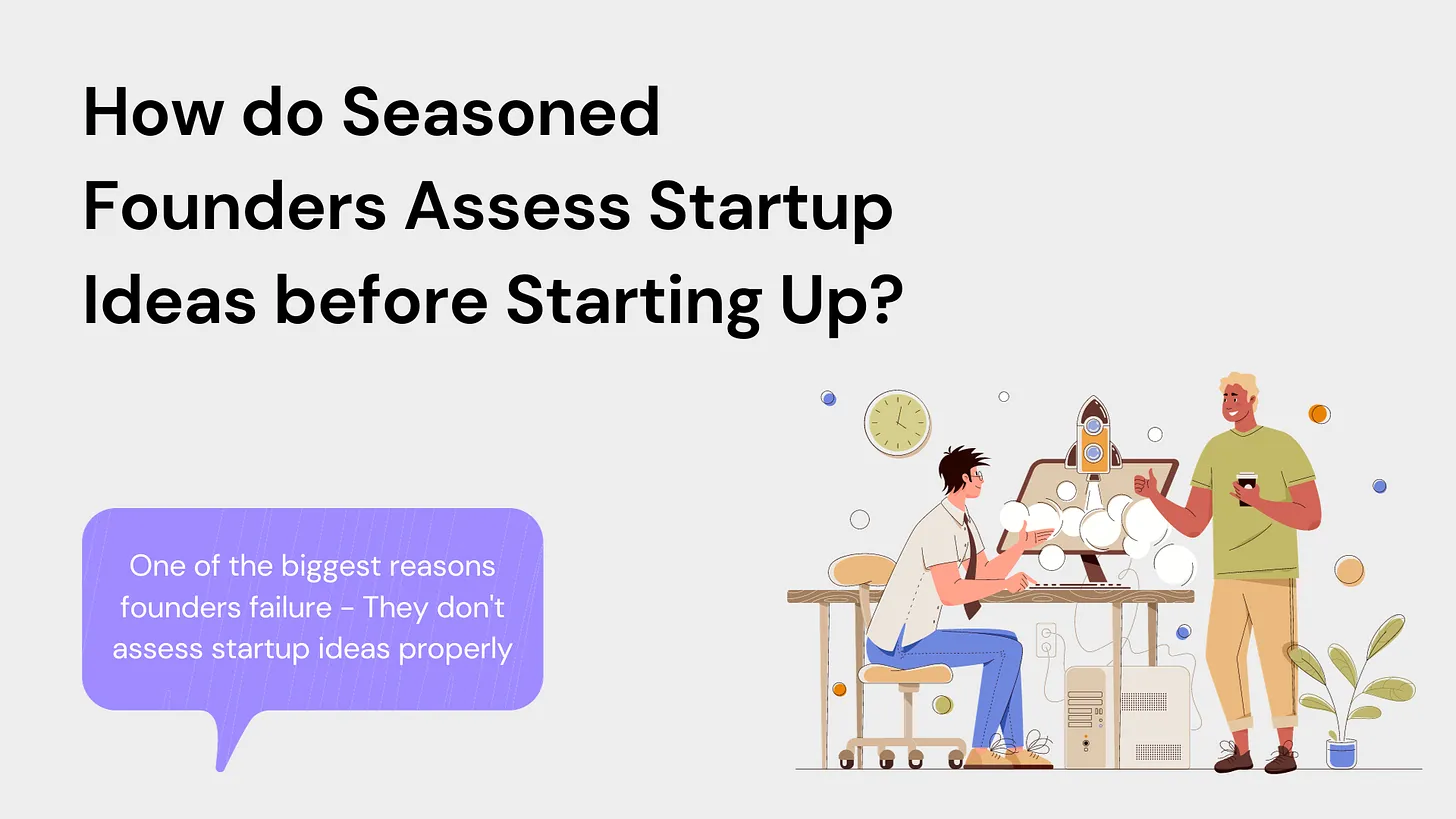One of the biggest reasons founders failure – They don’t assess startup ideas properly.
Hi, Hope things are going great on your end!
Today, we are going to discuss how seasoned founders assess Startup Ideas. We’ll discuss the following topics.
- How do they come up with fantastic ideas?
- What mistakes most first-time founders make while assessing startup ideas?
- How do they estimate the market size of the idea?
- What strategies do they use to estimate market demand?
- How do they crack the pricing code for their product?
- What early early-stage investors look for?
keep reading!!
1. How do they come up with fantastic startup ideas?
Nowadays, most founders choose a startup problem that
- They don’t have any clue
- They don’t have any experience
- They don’t have the zeal to solve the problem
- Don’t have market potential
They are doing just for the sake of doing
After some time, they lose hope and quit
Seasoned founders know Startup is a marathon, not a sprint.
They choose the problem correctly by
- Observing what problems they have faced and others are also facing
- Observe what problems others are facing, and they desperately need a solution
- Problems that they have observed/analyzed but people are not conscious of that
2. Common mistakes first-time founders make
“Don’t do a startup just for the sake of a startup; do it to solve a real problem.”
- Not solving a real problem: They focus on solving a problem that they think, not what customers think.
- Getting stuck on Tarpit Problems: Tarpit problems are those problems that fundamentally are not solvable.
- Not evaluating the Startup Market properly: Through emotional flow, they jump over the problem and land on ideas that don’t have potential.
- Waiting for Perfect Ideas: Most people are waiting for perfect ideas, but no “perfect idea” exists.
3. Estimating Market Size like a Pro
More than 90% of budding founders don’t know how to calculate market size.
They use internet figures to tell the market size.
Market Size = (Average Ticket Size) X (No of Customers)
Average Ticket Size = Average amount customers are paying annually for your product
No of Customers = Total number of potential people who can consider your product
Let’s say we have to calculate the Cable Operator market in India
Average amount people pay annually = Rs 200 X 12 = Rs 2400
Let’s say 20% of India’s households (with avg 4 people) opt for cable on their television = 1.40/4 Bn X 0.2 = 0.07 Bn.
Total Market Size = 0.07 Bn X Rs 2400 = Rs 168 Bn ~ $2 Bn
4. Strategies to Estimate Market Demand
- Use SEO & and keyword research to understand what people are looking for and what keywords they are using to get their solution.
- Use Google Trends to analyze and compare the frequency of keywords that people are searching.
- Understand Competitors’ pricing and distribution Strategy to understand paying capacity and mode of reaching customers.
- Best Way: Try to sell your product to the end customer. Their intent of purchase gives you a clear indication.
5. Cracking Price Code for your product or service
Many founders undercharge their product or keep it free because they have the fear of losing customers or not having confidence in their product.
However, the paying capacity of customers is determined by how much you are charging and how much you are confident about your product.
Not vice-vera!!
If you charge high, the customer will automatically sense that this is of high value.
Now, the question is, how can you determine the price of your product?
For this, you can use the following 4 ways
- Look into your Competitors’ Pricing Strategy, compare your product, and determine pricing for your product.
- Look into Pricing of Similar Products, compare, and determine pricing for your product.
- Estimate the price of value that your product is going to provide to customers.
- Best Strategy: Try to sell your product at higher prices to customers
6. Expectations of Early-Stage Investors from Founders
Most budding founders question the impact of solutions and differentiation from other players. But is this important to an investor or a veteran founder?
The answer is NO
Most early-stage investors are looking for Founder-Product-Market-Fit.
But what is this??
Founder-Product-Market Fit (FPMF) is a concept that’s like the foundation of a successful business.
Let’s break it down into simple terms:
- Founder: It’s crucial that you deeply understand and are passionate about the problem you’re trying to solve with your business idea.
- Product: It’s essential that your product effectively solves the problem or fulfills a need in a way that customers like.
- Market: It’s your potential customers. You need to identify who they are, where they are, and what they want.
Now, here’s where the “fit” part comes in:
Founder-Product-Market Fit means that as a founder, you’ve not only come up with a product but also made sure that it’s something your target market really wants and is willing to pay for.
It’s like finding the perfect match between what you’re passionate about, what you’re selling, and what your customers need.
What Next??
Alright, that’s a wrap for today’s edition! See you next week in your inbox next week.
Don’t miss to follow us on social media for more content.
LinkedIn | Instagram | YouTube
If you haven’t subscribed to this newsletter yet, please subscribe
Get hacks, lessons and stories from entrepreneurs on building successful startups from their first500days of startups


